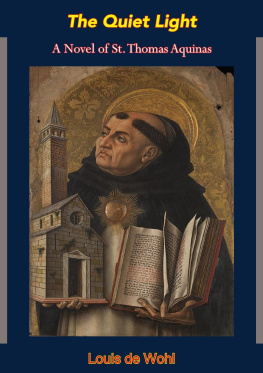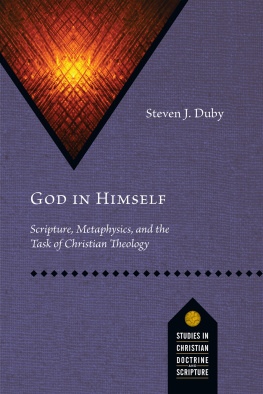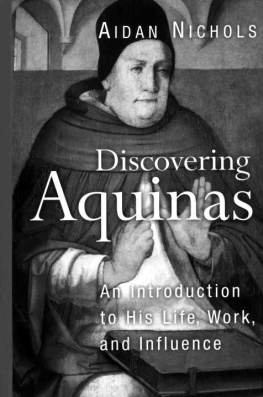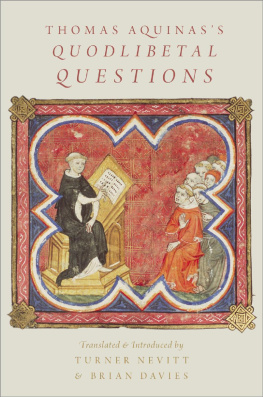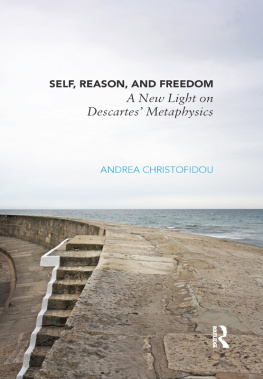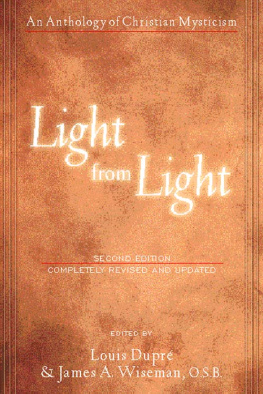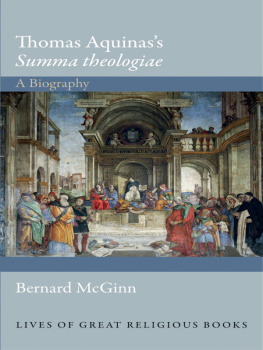Stephen Louis Brock - The Light That Binds: A Study in Thomas Aquinass Metaphysics of Natural Law
Here you can read online Stephen Louis Brock - The Light That Binds: A Study in Thomas Aquinass Metaphysics of Natural Law full text of the book (entire story) in english for free. Download pdf and epub, get meaning, cover and reviews about this ebook. year: 2020, publisher: Wipf and Stock Publishers, genre: Science. Description of the work, (preface) as well as reviews are available. Best literature library LitArk.com created for fans of good reading and offers a wide selection of genres:
Romance novel
Science fiction
Adventure
Detective
Science
History
Home and family
Prose
Art
Politics
Computer
Non-fiction
Religion
Business
Children
Humor
Choose a favorite category and find really read worthwhile books. Enjoy immersion in the world of imagination, feel the emotions of the characters or learn something new for yourself, make an fascinating discovery.

- Book:The Light That Binds: A Study in Thomas Aquinass Metaphysics of Natural Law
- Author:
- Publisher:Wipf and Stock Publishers
- Genre:
- Year:2020
- Rating:4 / 5
- Favourites:Add to favourites
- Your mark:
- 80
- 1
- 2
- 3
- 4
- 5
The Light That Binds: A Study in Thomas Aquinass Metaphysics of Natural Law: summary, description and annotation
We offer to read an annotation, description, summary or preface (depends on what the author of the book "The Light That Binds: A Study in Thomas Aquinass Metaphysics of Natural Law" wrote himself). If you haven't found the necessary information about the book — write in the comments, we will try to find it.
The Light That Binds: A Study in Thomas Aquinass Metaphysics of Natural Law — read online for free the complete book (whole text) full work
Below is the text of the book, divided by pages. System saving the place of the last page read, allows you to conveniently read the book "The Light That Binds: A Study in Thomas Aquinass Metaphysics of Natural Law" online for free, without having to search again every time where you left off. Put a bookmark, and you can go to the page where you finished reading at any time.
Font size:
Interval:
Bookmark:
A Study in Thomas Aquinass
Metaphysics of Natural Law
Stephen L. Brock

The Light that Binds
A Study in Thomas Aquinass Metaphysics of Natural Law
Copyright 2020 Stephen L. Brock. All rights reserved. Except for brief quotations in critical publications or reviews, no part of this book may be reproduced in any manner without prior written permission from the publisher. Write: Permissions, Wipf and Stock Publishers, W. th Ave., Suite , Eugene, OR 97401 .
Pickwick Publications
An Imprint of Wipf and Stock Publishers
W. th Ave., Suite
Eugene, OR 97401
www.wipfandstock.com
paperback isbn: 978-1-5326-4729-1
hardcover isbn: 978-1-5326-4730-7
ebook isbn: 978-1-5326-4731-4
Cataloguing-in-Publication data:
Names: Brock, Stephen Louis, author.
Title: The light that binds : a study in Thomas Aquinass metaphystics of natural law / Stephen L. Brock.
Description: Eugene, OR : Pickwick Publications, 2020 | Includes bibliographical references and index(es).
Identifiers: isbn 978-1-5326-4729-1 ( paperback ) | isbn 978-1-5326-4730-7 ( hardcover ) | isbn 978-1-5326-4731-4 ( ebook )
Subjects: LCSH: ThomasAquinas Saint 1225?1274 . | Natural law.
Classification: B765.T54 B76 2020 ( print ) | B765.T54 B76 ( ebook )
Manufactured in the U.S.A.: April 10, 2020
To Charlie, Jim, Tom, and their families
De decem preceptis: Collationes in decem preceptis(Sermons on the Ten Commandments)
De malo: Quaestiones disputatae De malo (Disputed Questions on Evil)
De spir. creat.: Quaestio disputata De spiritualibus creaturis (Disputed Question on Spiritual Creatures)
De sub. sep. : De substantiis separatis (On Separate Substances)
De ver.: Quaestiones disputatae De ueritate (Disputed Questions on Truth)
De virt.: Quaestiones disputatae De uirtutibus (Disputed Questions on the Virtues)
In De an.: Sentencia Libri De anima (Commentary on Aristotles De anima )
In De div. nom.: Super Librum Dionysii De divinis nominibus (Commentary on ps.-Dionysiuss On the Divine Names )
In De Trin.: Super Boetium De Trinitate (Commentary on Boethiuss De Trinitate )
In Eth.: Sententia Libri Ethicorum (Commentary on Aristotles Nicomachean Ethics )
In Meta.: Sententia super Metaphysicam (Commentary on Aristotles Metaphysics )
In Peryerm.: Expositio Libri Peryermenias (Commentary on Aristotles De interpretatione )
In Phys.: Sententia super Physicam (Commentary on Aristotles Physics )
In Pol.: Sententia Libri Politicorum (Commentary on Aristotles Politics )
In Post. an. : Expositio Libri Posteriorum (Commentary on Aristotles Posterior Analytics )
In Rom.: Super Epistolam Pauli Apostoli ad Romanos (Commentary on St Pauls Epistle to the Romans )
In Sent.: Scriptum super libros Sententiarum (Commentary on Peter Lombards Sentences )
QD De an.: Quaestio disputata De anima (Disputed Question on the Soul)
ScG : Summa contra Gentiles
ST: Summa theologiae
Passages of the Summa theologiae are cited as in these examples:
I.. : Prima pars , q. , a.
I.. ad : Prima pars , q. , a. , ad
I.. sc: Prima pars , q. , a. , Sed contra
III.. ad / ad : Prima secundae , q. , a. , ad and ad
III.. obj / ad : Prima secundae , q. , a. , obj. and ad
IIII.. c / ad : Secunda secundae , q. , a. , corpus and ad
The Sentences commentary and Disputed Questions are cited in similar ways. In Sentences commentary citations, qc stands for quaestiuncula .
The law of nature, declares Saint Thomas, is nothing other than the light of the intellect instilled in us by God, through which we know what is to be done and what is to be avoided. In his more technical moments, Thomas will distinguish a little between the minds light and natural law, the law being a set of truths, and the light being what manifests them and lets us understand them. But once lit up, the truths are also a light, showing us a path to follow. In some sense they even oblige us, bind us, to that path. Natural law is a light that binds.
The question running through the following pages is how exactly it is, for Aquinas, that the truths of natural law constitute a genuine law and carry real binding force. I shall motivate the question and survey various answers that it has received in chapter . There I shall also explain the plan of the rest. Here I would like to say something about my subtitle.
By far the bulk of Thomass writing on natural law is found in his masterpiece, the Summa theologiae . So situated, it is obviously a theological teaching. I hope that I have kept its theological character sufficiently in view. Nevertheless, as with many of the topics presented in the Summa , its treatment of natural law involves very heavy use of philosophical sources and arguments. This is hardly surprising, if indeed natural law itself is a work of the human minds natural light. For that is also philosophys proper light. I see no need to apologize for wanting to concentrate on Thomass philosophy of natural law.
Philosophy, though, has many parts. The truths of natural law, Thomas tells us, constitute the first principles of practical reason. The practical part of philosophy is moral philosophy or ethics. Metaphysics, by contrast, is speculative or theoretical, not practical. What has metaphysics got to do with natural law?
The truths of natural law are certainly not, for Thomas, the first principles of metaphysics itself. The field of metaphysics is all of reality, being itself, and its own principles are more far-reaching, and even more basic, than those that bear only on human conduct. Of course human conduct is a being tooit existsand so its principles do somehow fall within the metaphysical purview. The metaphysician can speculate about anything. But the study of human conduct in light of the truths of natural law, both in its matter and in its purpose, is surely a practical undertaking. By that very fact, natural law pertains to moral philosophy.
It is one thing, however, to study a field in light of its principles. It is another thing to study the principles themselves. In Thomass conception of philosophy, studying the principles of any field whatever is a metaphysical task. Every other part of philosophy takes the principles of its field for granted and seeks only to draw out the implications from them that make for full mastery of that field. Moral philosophy draws practical conclusions from the principles of natural law. But the fundamental treatment of all first principles, both those of metaphysics itself and those of the other parts of philosophy, whether speculative or practical, belongs to metaphysics. The mere fact that the principles are really principles and not conclusionsthe fact that they do not need to be demonstrated, in light of other principlesdoes not preclude such treatment. For instance, the principles still need to be identified. The terms comprising them need to be clarified so as to achieve and to judge the precise formulations of them. And doubts or difficulties about them can arise and need to be resolved. These are metaphysical exercises.
Moreover, if metaphysics has one primary task, it is to trace all the fields of philosophy and all of their principles back to the very first explanations or causes of all reality and all truth. This is metaphysics in its character as wisdom.
But perhaps most importantly, at least as far as this book is concerned, the very question of how Thomas thinks natural law constitutes a law is closely tied to the question of his view of its relation to God. In a sense, the whole book is an attempt to determine the meaning and drift of his famous description of natural law as nothing other than a participation of the eternal law in the rational creature. The eternal law is Gods law. If only for this reason, the perspective cannot but be heavily metaphysical.
Font size:
Interval:
Bookmark:
Similar books «The Light That Binds: A Study in Thomas Aquinass Metaphysics of Natural Law»
Look at similar books to The Light That Binds: A Study in Thomas Aquinass Metaphysics of Natural Law. We have selected literature similar in name and meaning in the hope of providing readers with more options to find new, interesting, not yet read works.
Discussion, reviews of the book The Light That Binds: A Study in Thomas Aquinass Metaphysics of Natural Law and just readers' own opinions. Leave your comments, write what you think about the work, its meaning or the main characters. Specify what exactly you liked and what you didn't like, and why you think so.

